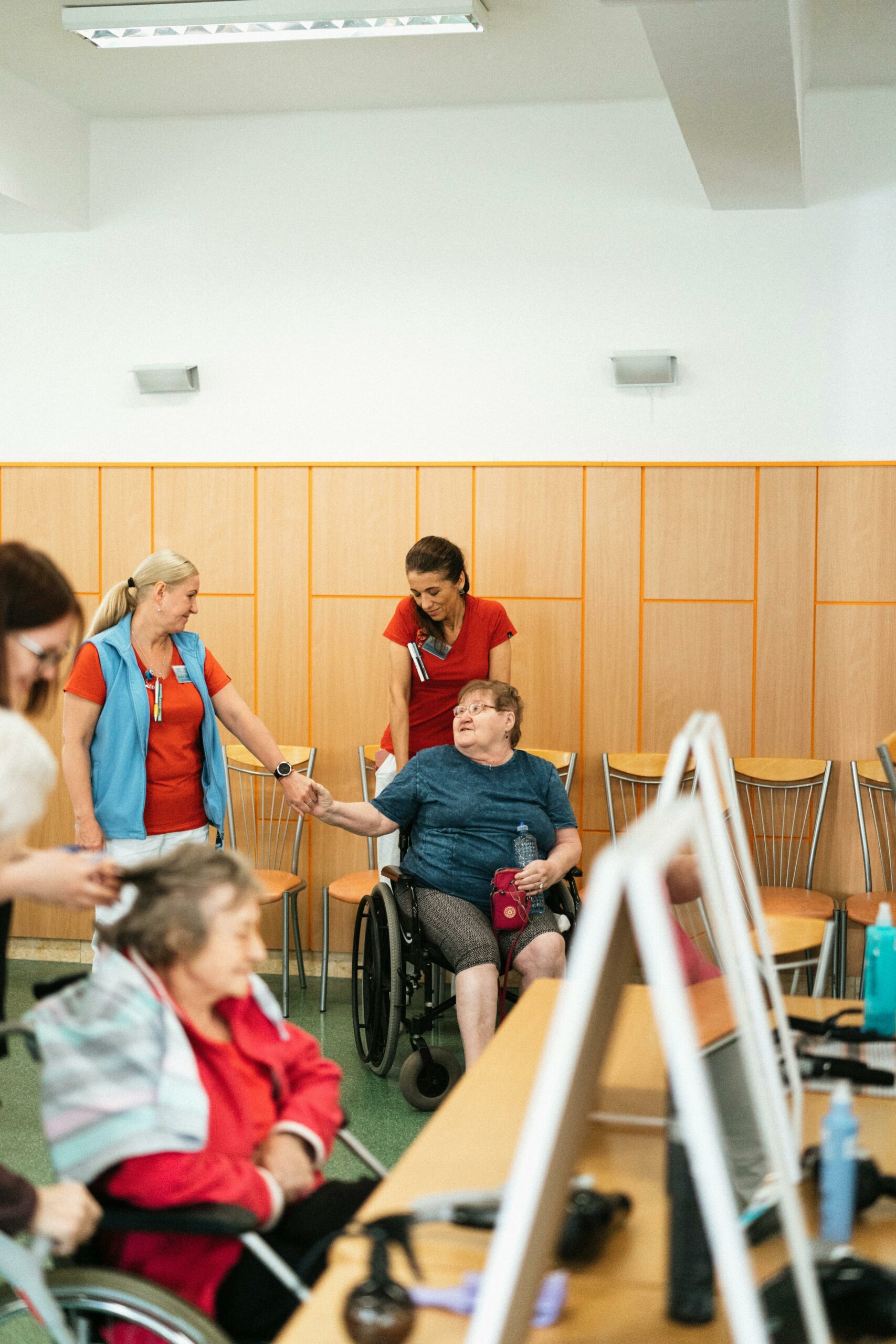A Day in the Life of a Support Worker: Real-World Insights
Support work is one of those professions where no two days are ever the same. A support worker plays a vital role in helping individuals live with dignity, independence, and confidence. Whether it’s assisting with daily routines, teaching life skills, or simply being there to listen, the work is filled with variety, challenges, and incredible rewards.
If you’ve ever wondered what it’s like to walk in the shoes of a support worker, this article gives you a real-world look into their daily life. It also highlights how training programs like Cert 3 Support Worker, Certificate 3 in Individual Support, and flexible study options such as Cert 3 Individual Support Online prepare you for this career.
Starting the Day with Care
For most support workers, the day begins early. Mornings are often about helping individuals with their personal routines. This may include:
- Assisting with personal care such as bathing, grooming, or dressing.
- Helping with medication reminders to ensure health needs are met.
- Preparing a nutritious breakfast and encouraging healthy eating habits.
What makes these tasks special is not just the activity itself, but the manner in which they’re carried out. Support workers aim to empower individuals, encouraging them to do as much as they can independently while providing assistance only where needed. This balance is crucial; it promotes dignity and builds confidence.
Training gained during the Certificate 3 in Individual Support ensures that support workers understand how to provide care respectfully while fostering independence.
Household Tasks and Goal-Oriented Support
Once the morning routine is done, the focus often shifts to household chores and skill development. This could involve:
- Planning meals and assisting with grocery shopping lists.
- Helping with light cleaning tasks such as vacuuming or laundry.
- Supporting individuals to learn or practice new skills, like cooking simple meals.
The aim here is not to “do everything” for the individual but to encourage participation. For instance, instead of cooking an entire meal alone, a support worker might guide someone through chopping vegetables or setting the table. These small but meaningful tasks help individuals feel more engaged in their daily lives.
Completing a Cert 3 Support Worker course equips professionals with the practical knowledge needed to assist in this way, making the work not only efficient but also empowering for the person being supported.
Community Engagement and Social Interaction
Afternoons are often dedicated to community engagement, an essential part of a support worker’s role. This could mean:
- Accompanying someone to a medical appointment.
- Going for a walk in the park or taking a trip to the local library.
- Supporting attendance at social clubs, group activities, or hobby classes.
- Helping individuals build confidence by interacting with others in public spaces.
Community involvement is about much more than simply “getting out of the house.” It builds social connections, reduces feelings of isolation, and helps people feel they are part of something bigger.
Support workers often describe this as one of the most rewarding parts of their day, watching someone light up with joy while engaging with others, learning something new, or just enjoying a day out.
With options like Cert 3 Individual Support Online, many aspiring support workers can gain the skills they need to promote social inclusion while studying flexibly around their schedule.
Emotional Support: A Quiet but Powerful Part of the Job
Not all support work is physical. In fact, one of the most valuable contributions a support worker makes is emotional support.
This might involve:
- Listening patiently when someone shares their worries or frustrations.
- Offering encouragement when they feel unmotivated.
- Providing reassurance during times of change or uncertainty.
- Celebrating achievements, big or small, to build self-esteem.
The Certificate 3 in Individual Support prepares support workers with essential communication skills, teaching them how to listen empathetically, respond thoughtfully, and maintain professional boundaries while still offering compassion.
Sometimes, just being a calm and consistent presence can make all the difference in someone’s day.
Wrapping Up with Comfort and Stability
As the day winds down, support workers often help individuals prepare for the evening and night ahead. This could include:
- Preparing a light dinner together.
- Assisting with evening routines like personal hygiene or getting ready for bed.
- Spending time relaxing, whether through board games, movies, or quiet conversation.
The goal is always to create a sense of safety, stability, and comfort. Support workers often finish their day with notes or updates in communication books to ensure continuity of care for the next shift.
By maintaining strong communication, both with the individual and with the broader care team, support workers ensure that everyone stays informed about progress, challenges, and plans moving forward.
Key Qualities That Make a Great Support Worker
From speaking with experienced professionals, a few common traits stand out as essential for success in this career:
- Flexibility: No two days are the same, so being adaptable is crucial.
- Patience: Individuals may take time to learn or adjust, and patience creates a supportive environment.
- Strong communication skills: Essential for connecting with individuals, families, and healthcare teams.
- Empathy: Understanding and relating to someone’s emotions helps build trust.
- Resilience: Support work can be emotionally demanding, so resilience is key to maintaining balance.
These qualities are nurtured and strengthened through training programs like Certificate III in Individual Support, Government Funded, which combine theory with real-world practice.
Real-World Insights: What Support Workers Say
Many support workers describe their job as both challenging and deeply rewarding. Here are some real-world insights shared by those in the field:
- Every day is different. Some days we’re out in the community, other days we’re at home working on skills. The variety keeps the job interesting.
- One of the most rewarding moments for me was seeing someone I supported regain contact with their family. Being part of that journey was priceless.
- It’s not always easy, but the small wins, like someone learning to cook their own meal, make it all worth it.
These insights highlight how meaningful the work truly is. While challenges exist, the positive impact on people’s lives outweighs the difficulties.
Training Pathways to Become a Support Worker
For those inspired by this career, the right training is the starting point. Courses such as:
- Cert 3 Support Worker
- Certificate 3 in Individual Support
- Certificate III in Individual Support Government Funded (for those eligible for subsidised study)
These programs prepare students with both the knowledge and hands-on skills needed to thrive in support work. Topics often include:
- Providing individualised support.
- Working with diverse people.
- Supporting independence and well-being.
- Following safe work practices.
- Effective communication and teamwork.
Completing one of these qualifications not only opens doors to employment but also lays the foundation for a long-term career in community services and aged care.
Why Support Work Is More Than Just a Job
At the heart of it, support work is about people. It’s about showing up, being present, and helping others lead fuller, more independent lives. The tasks may range from cooking meals to attending appointments, but the real value lies in the relationships built along the way.
For the individuals receiving support, it’s about having someone they can trust and rely on. For the support worker, it’s about the joy of knowing you’ve made a difference sometimes in ways that may seem small but have a huge impact.
Final Thoughts
A day in the life of a support worker is dynamic, varied, and fulfilling. From assisting with daily routines and developing life skills to promoting community engagement and offering emotional support, the role impacts every aspect of an individual’s well-being.
If you’re considering this path, investing in training through a Certificate 3 in Individual Support, whether through traditional study or Cert 3 Individual Support Online, is a great step. And if you qualify for a Certificate III in Individual Support, Which Is Government-Funded, you can start this rewarding career journey with financial support.
For the best training experience, many students choose DP Training, a trusted institute known for delivering quality education, flexible learning options, and real-world support to prepare you for a successful career as a support worker.



